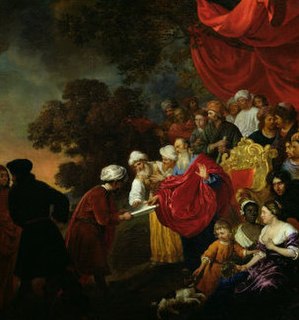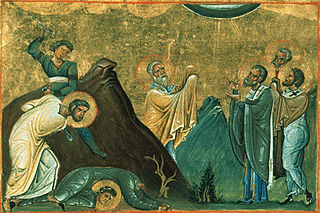Kadmiel: before God; i.e., his servant, one of the Levites who returned with Zerubbabel from the Babylonian captivity (Nehemiah 9:4, 10:9, 12:8).
A Levite is a Jewish male descended patrilineally from the Tribe of Levi. The Tribe of Levi descended from Levi, the third son of Jacob and Leah. The surname Halevi, which consists of the Hebrew definite article "ה" Ha- ("the") plus Levi (Levite) is not conclusive regarding being a Levite; a titular use of HaLevi indicates being a Levite. The daughter of a Levite is a "Bat Levi".

According to the biblical narrative, Zerubbabel was a governor of the Achaemenid Empire's province Yehud Medinata and the grandson of Jeconiah, penultimate king of Judah. Zerubbabel led the first group of Jews, numbering 42,360, who returned from the Babylonian captivity in the first year of Cyrus the Great, the king of the Achaemenid Empire. The date is generally thought to have been between 538 and 520 BC. Zerubbabel also laid the foundation of the Second Temple in Jerusalem soon after.
The Babylonian captivity or Babylonian exile is the period in Jewish history during which a number of people from the ancient Kingdom of Judah were captives in Babylonia. After the Battle of Carchemish in 605 BCE, King Nebuchadnezzar of Babylon besieged Jerusalem, resulting in tribute being paid by King Jehoiakim. Jehoiakim refused to pay tribute in Nebuchadnezzar's fourth year, which led to another siege in Nebuchadnezzar's seventh year, culminating with the death of Jehoiakim and the exile of King Jeconiah, his court and many others; Jeconiah's successor Zedekiah and others were exiled in Nebuchadnezzar's eighteenth year; a later deportation occurred in Nebuchadnezzar's twenty-third year. The dates, numbers of deportations, and numbers of deportees given in the biblical accounts vary. These deportations are dated to 597 BCE for the first, with others dated at 587/586 BCE, and 582/581 BCE respectively.
![]()
The public domain consists of all the creative work to which no exclusive intellectual property rights apply. Those rights may have expired, been forfeited, expressly waived, or may be inapplicable.
Matthew George Easton was a Scottish minister and writer. His most known work is the Easton's Bible Dictionary, published three years after his death.

The Illustrated Bible Dictionary, better known as Easton's Bible Dictionary, is a reference work on topics related to the Christian Bible compiled by Matthew George Easton. The first edition was published in 1893, and a revised edition was published the following year. The most popular edition, however, was the third, published by Thomas Nelson in 1897, three years after Easton's death. The last contains nearly 4,000 entries relating to the Bible. Many of the entries in Easton's are encyclopedic in nature, although there are also short dictionary-type entries.
| This article related to the Hebrew Bible is a stub. You can help Wikipedia by expanding it. |










